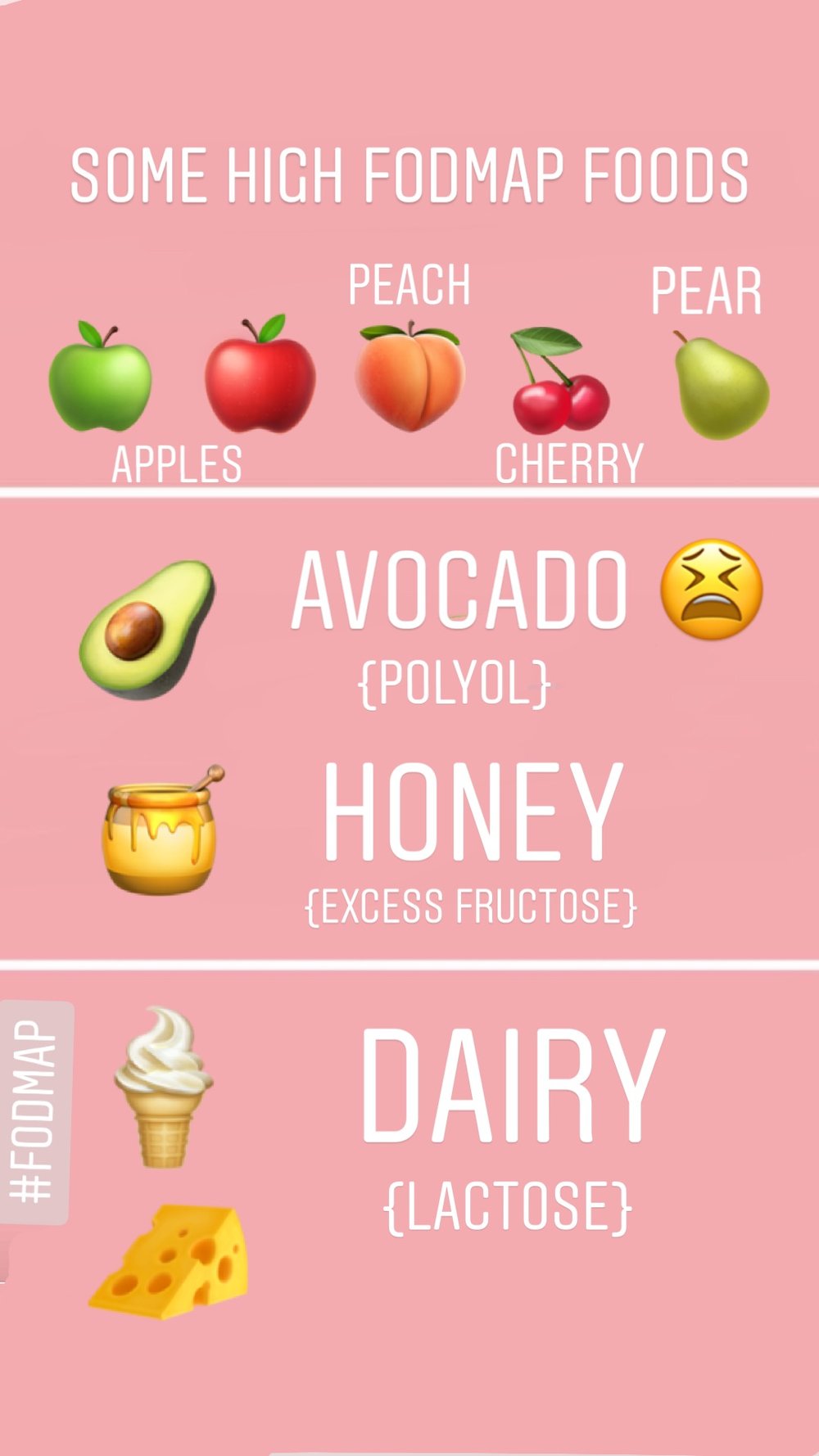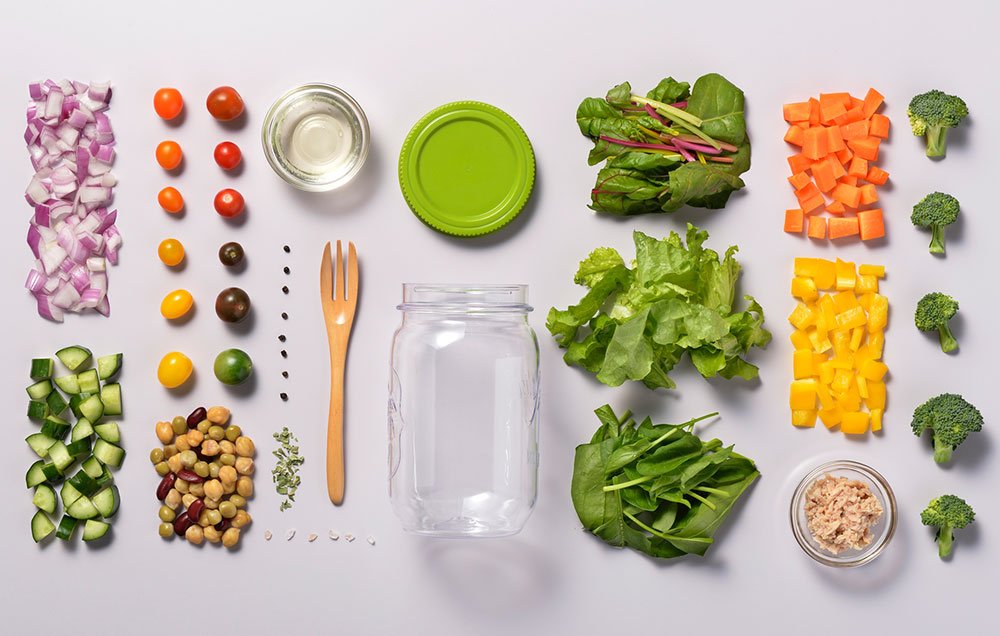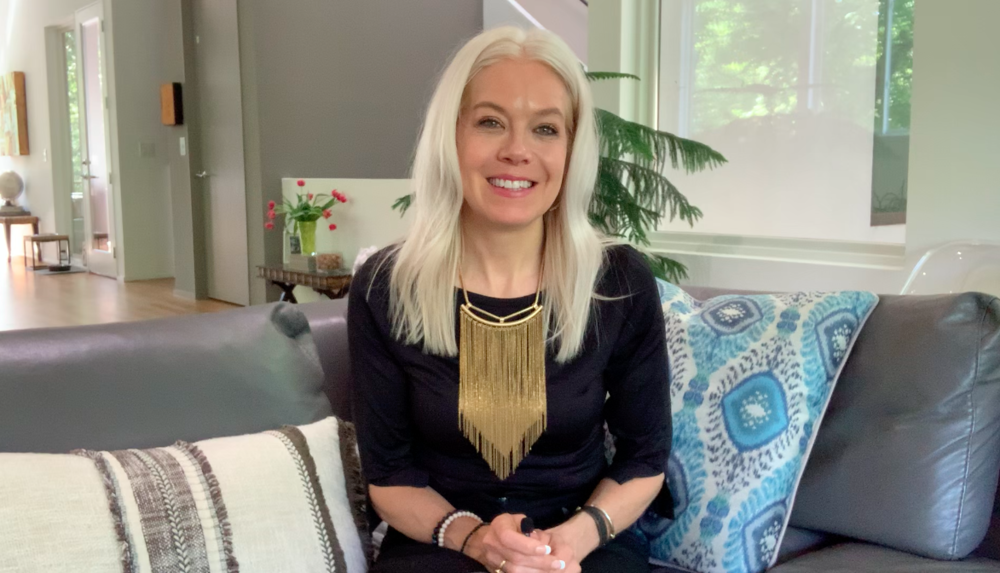
Low FODMAP foods include pineapple, kiwi, coconut, spinach, walnuts, almonds/nut butter, maple syrup and others
FOD- what?
The first time I heard about this crazy spelled and sounding diet I have to admit, I was less than interested. First of all the name threw me, and quite honestly it wasn’t a personal concern because this diet is for people who suffer from irritable bowel syndrome (or IBS). Oh you’ve seen the commercial for the drug Viberzi, it’s brilliant and makes me laugh. It shouldn’t, but shamefully it does [if you haven’t seen it then google it].
Imagine a woman who looks like she’s getting ready for a hot date and suddenly, oh no, plans have turned for the worst in an instant. This lil’ redhead dressed in a nude, full body leotard with the outline of the large and small intestines imprinted on her belly, informs the woman who’s ready for a fun night out that nope, you’re not going anywhere cuz you’re going to run from watching Netflix on the couch to your bathroom all night long. Oh the joy.
Unfortunately the last half of the commercial runs through the laundry list the negative side effects. My philosophy is to find the root cause of the health issue instead of defaulting to a bandaid approach, which medicine feels like to me. I think we way overmedicate in this country for situations that could be significantly changed by diet and lifestyle but hey, that’s just me. I’ve always resonated with a more holistic approach and I work hard to avoid meds at all costs (they are too expensive, am I right?). In my professional opinion, FOOD IS EVERYTHING and making dietary changes can radically shift peoples health a vast majority of the time.
Thankfully, IBS hasn’t been my story. BUT not only have I struggled with a variety of GI issues for most of my life, I also know and work with a lot of IBS sufferers. And yes, their lives DO revolve around food and how their body reacts to it. It’s a bit of a miserable existence for the ones I know or work with and I really love to work like the detective to assist with identifying their food sensitivities.
Oh hey, if you’re squeamish when it comes to talking about taking out your trash aka bowel habits, ya might not want to read this post. I get it, not everyone can talk about poop but as a health care practitioner who does work with GI health, I do go there because your body garbage says a LOT about your health. Yeah, so if this makes you uncomfortable then head over to my blog posts on something I’ve whipped up in the kitchen high in fiber and plants that helps with good poop. Just kidding, I don’t associate recipes with their digestive side effects in the actual post so you’re safe!
Ok so back to IBS…. IBS is usually either IBS-C (constipation) or IBS-D (diarrhea) or for the lucky ones it can vacillate between the two. Symptoms of IBS are often times embarrassing and uncomfortable – like gas, bloating, abdominal pain and cramping as well as debilitating symptoms like chronic diarrhea and/or constipation. No butt’s about it, IBS stinks!
So while I admit, I’ve definitely struggled with my share of digestive complications, I’m very grateful that it hasn’t caused me to avoid things that are important to me like traveling, snowboarding, yoga, exercising or living life.
THANKFULLY.
But it can really wreck your dreams if you are suffering and not experiencing the life you deserve.

One of my fav breakfast meals will have to be re-vamped during the Elimination Phase since blackberries and cashews (yogurt) are both high FODMAP foods. Bummer!
Since everyone likes to share through story, I’ll give you some background info on me which might help you understand why I’m willing to experiment with this seemingly restrictive diet. As a baby, my belly was soooooooo buddha big that my mother said that she could put me down in the middle of the floor when I was clearly at the age where I should start to crawl – but I couldn’t move for hours. Fortunately she got a ton of housework done while I was there, immobile, stuck on my big ol’ distended tummy. This is no joke, I actually learned how to walk before I could crawl. Great, I probably have some deep-seated PTSD to sort through on that one. Which might explain my life-long GI frustration and decades upon decades of a chronically sensitive stomach.
But it was never debilitating enough to seek medical assistance. There didn’t seem to be any rhyme or reason to my belly situation but looking back now at my medical history, things totally make sense: throat infections that resulted in bronchitis or bronchial pneumonia or strep throat blah, blah, blah. This meant rounds of antibiotics which meant flat-lined gut bacteria which, for me, lead to insatiable sugar cravings, whacked out GI and gut dysbiosis (gut microbial imbalance).
But back then, we didn’t know all that fancy schmancy gut info and how your gut bacteria can shift in a matter of three days! Regardless, my intuition in college said FOOD IS EVERYTHING but I still struggled to get a good grip on my digestive health. College life certainly did not help. I’ve poked and prodded at my diet and lifestyle for several decades and still feels like the riddle is not quite solved. And now that we about the important role food plays on your entire inner eco-system you can shave off time (hopefully won’t go as long as I did) and reduce your struggle.
In a nutshell, I transitioned from a Julia Child’s upbringing (God bless my Mother who is an amazing cook!), dabbled with Weight Watchers a couple of times after college. Ugh, no offense but that frozen WW “food” never ever resonated with me and quite frankly I found a loophole to get my sugar needs met (anyone else save points for multiple ice cream bars?). Burned out on the whole diet thang and I just went about my way with life. It was far from healthy but it was part of my journey, no judgment. I was young, living in Hawaii and having loads of FUN with absolutely zero regrets.
It wasn’t until I got real with my health, juicing and incorporating whole foods into my daily diet that I started to connect the dots, somewhat. Juicing can be very healthy, or not if it’s loaded with fruits and too many veggies (think beets and carrots- yes too much of a good thing is still too much depending on the condition of your health). I fall into the camp of heavy leafy green juices with half of a small tennis-ball sized apple or pear. My current version has evolved into very green, very healing, very therapeutic.

What I usually have for breakfast: fresh pressed green juice with kale dandelion lemon turmeric, ginger herbs like parsley cilantro basil and/or mint + 1/2 apple or pear (removing apple and pear during Challenge Phase… boo)
Once I discovered I had a pretty significant dairy intolerance (at the time diagnosed as an allergy) and did 21 days without cheese, milk, cheese, ice cream, cheese, or cheese, I could NOT believe how much better every part of my body felt and worked. From my breathing, to my belly, to my digestion, to my food cravings, to my poo which of course also positively impacted my sleep. Which of course positively impacted my mental and physical wellbeing and desire to continue moving towards optimal health. Exercise became important (again) and a non-negotiable (still is). I kept moving forward at a pace that, at the time, was right for me.
However, where I was mentally in my life was disconnected. I was doing all the “right” things – in the “right” relationship, on the “right” career path, all the programming from family and loved ones who only wanted the best for me. Eventually I would learn that their definition of best was quite different than mine. And eventually I thought about then chased after the life I wanted to create but I’ll do another blog post about that later if you’re interested.
I wasn’t quite aware of that work/life unbalance just yet, shifting my focus on the evolution of my diet and lifestyle instead. Next step was going vegan, not always healthy but I tried as best I could, which thankfully spiraled into a raw and plant-based diet. And finally, FINALLY once I started flooding my body with plant-based nutrition, vitamins, minerals, fiber, water, the information my body seemed to be thriving on while removing the problematic foods that didn’t agree with my digestive system (dairy and gluten), I felt AMAZING!!!!!!
✧HEALTHY!
✧VIBRANT!
✧HIGH (nope, not from dope)!
✧UNSTOPPABLY BULLET-PROOF!
It was downright intoxicating to be quite honest. But also rather restrictive (especially after discovering my other personal food intolerances) and unsocial, again definitely part of my food journey. Which now brings me to the present moment. Well, almost.
So then Mindful Eating found me and that blew the doors off my old diet-based food beliefs, habits and everything related to nourishing my body, which is why I created my 30-Day Mindful Eating Challenge to help others. I finally un-did all the dieting of the past and established a healthy and solid relationship with food. FINALLY ended my food struggle on just about every possible level!! Or so I would think….
That is until a low FODMAP diet circled back on my radar. During my dietetic internship years ago we learned about this diet for IBS, but it didn’t resonate with me cuz, again I didn’t have it. But as I’ve been working with refining my mindful eating skills, adding back in “forbidden” diet foods of the past with love and moderation, I became curious about my fluctuating GI habits. Is it because I’m enjoying some sourdough bread, chocolate chip cookies, sugar, alcohol, what is it? My tummy never seemed to resolve 100% even though I feel like I eat a very balanced, nutrient-dense and plant-heavy diet. Definitely WAY better, but I still have some question marks. I know that the mindful eating skills I’ve worked hard on cultivating set me up for being in the healthiest place with food, mentally, that I could journey with a 2-6 week restrictive diet to challenge foods that might not digest well. And here I am. Transitioning onto a low FODMAP diet to see if this has any impact on my belly bloat.
And ya wanna know what? So far it has, it does, it continues to.
Even in the short amount of time that I’ve been experimenting with it, weaning off my favorite high FODMAP foods (think apples, pears, avocado, mango, sweet potato just to name a few – and figs are coming into season).

just a few of the high FODMAP foods…
So let me apologize for not breaking down the FODMAP acronym for you earlier. My bad. I got carried away with going off about me me me.
F= Fermentable (sugars and fibers that create gas by being broken down by your friendly gut bacteria)
O= Oligosaccharides
D= Dissacharides
M= Monosaccharides
A= and
P= Polyols
These fancy, perhaps scary-lookin’ words are actually carbohydrates. More specifically sugars and fibers that your digestive system can struggle with breaking down properly, if you have a sensitive belly. I know what you’re thinking, “See I knew I should avoid carbs!” No, carb’s are NOT the evil food category everyone makes them out to be. But if you struggle with IBS-like symptoms then you might be wise to explore this option with your gastroenterologist as well as a registered dietitian (hey there, that’s me).
I don’t have IBS, but I’ve wondered for a long-arse time if I did have a very mild case or fall on some IBS-ish spectrum. My system has been so incredibly inconsistent, no rhyme or reason or need to schedule an appointment with a gastro to discuss. It’s never limited my life, but I do think about food and my belly when it gets stagnant and things shut down like traffic on I-75 in Atlanta.
Just like when clients come to me, I love to piece their health together like a puzzle and figure out their individual solution. This time I’m open to exploring and experimenting on me, yet again. I’m thinking that perhaps, just perhaps, there could be a couple of FODMAP foods that don’t jive with me. And lemme say it again, I’m finally in a healthy place with food, where I am willing to be somewhat restrictive for the short 2-6 week elimination phase without it causing any frustration, deprivation, or restrictive eating like elimination diets have done in the past. Yeah I had a full blown meltdown at a restaurant the day I found out I was highly intolerant to garlic because every.thing. on their menu that I wanted to eat had garlic. So I ate nothing. And pouted. Miserable dining guest.
While we are on the topic I’ll tell you my situation with garlic that I’ve told a million clients (okay that’s a bit of a stretch number). One thing I used to struggle with was chronic cravings for something sweet after lunch. Used to drive me crazy. That is until I cut out garlic for a good 6-8 weeks. All of a sudden, I noticed that I wasn’t fighting the urge to dive into the chocolate after lunch. And THAT was odd, lemme tell you. I didn’t know how to handle it. So fast forward to when I started to gradually add garlic back into my life, I would crave chocolate or something sweet in exactly 20 minutes after eating something with garlic in it. That lasted for a while and now, I don’t notice it but funny that garlic (and onions) are high FODMAP foods so I feel there really is a solid connection to this for me.
Back on track — The FODMAPs diet is very similar to the elimination diet I’ve guided loads of clients through for everything from psoriasis and eczema to candida to GERD/reflux to wavering energy to a funky mood. Again, as a dietitian I am always going to default to food having some heavy influence on how you go about your day. And I know that when I eat a food and I immediately crash, it’s not because I didn’t get enough sleep (although that can be a reason as well as other health imbalances). My focus is “what did I just eat?”
Here’s the low-down with low FODMAP. It’s not the end all be all digestive nightmare dietary answer for everyone. Click here if you want to read recent research on the controversies and recent developments of the Low-FODMAP diet (on the right of the screen find similar articles and research on FODMAPs). But if you suffer from GI symptoms like abdominal pain, excess gas and/or bloating (I’ve actually taken pics of my belly because I looked to be about 3-4 months preggers – been there done that just last week in fact), diarrhea and/or constipation it’s a strong consideration.
* If you have been diagnosed with celiac disease this might not be the diet for you (unless, perhaps you follow a strict gluten-free diet and still remain symptomatic).
* If you’ve been diagnosed with IBS by your gastroenterologist and has suggested a low FODMAP diet, let’s talk.
* If you’ve been diagnosed with irritable bowel disease (IBD), small intestinal bacterial overgrowth (SIBO), non-celiac gluten-sensitivity (NCGS) or gastroesophageal reflux disease (GERD) a low FODMAP diet might be a consideration.
* LET ME MAKE THIS VERY CLEAR – A LOW FODMAP DIET IS NOT A TRENDY WEIGHT LOSS PROGRAM… in case you’re thinking that depriving yourself of certain high FODMAP foods will lead to weight loss. Don’t do it. I get the searching for the diet that will lead to weight loss mental process though. I was there for decades. Plural. However, this is for people who suffer from IBS symptoms like abdominal pain, excessive gas, bloating, diarrhea and constipation. So while the National Institute of Diabetes and Digestive and Kidney Diseases estimate that 10-15 percent of US adults suffer from IBS, only 5 percent are formally diagnosed.
If you think you have IBS it’s important to seek advice from a gastroenterologist. The initial elimination period of this diet is pretty restrictive and you will need guidance from a registered dietitian who ideally has worked with a low FODMAP diet to make sure you don’t set yourself up for nutritional deficiencies. BTW yes, that’s me.
Bottom line: it is vital for you to work directly with your medical professionals, especially gastro’s and GI dietitians since primary doctors might not be familiar with a low FODMAP diet (and sadly there are gastro’s who don’t know about it either so explore your options). If your gut isn’t happy and your system isn’t functioning well, it’s important to discover WHY or at least rule out food as the primary issue. Up to 75% of IBS patients have positive results with a low FODMAP diet and as it becomes more mainstream, that percentage could increase.

